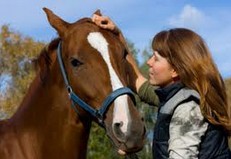发音:美式发音
语速:110词/分钟
使用方法:精听+听写
在古代,马在人们的日常生活中至关重要,因此无论中外,衍生了众多与“马”有关的俗语。马到功成、一马当先、千军万马、龙马精神……这些都是中文里耳熟能详的成语。那么本期,我们就一起来看看,英文中与“马”相关的习语又有哪些呢。
In the past, many people depended on horses for transportation, farming and other kinds of work. A lot of people still like to ride horses. And horse racing is also popular. So it is not surprising that Americans still use expressions about the animals.
Long ago, people who were rich or important rode horses that were very tall. Today, if a girl acts like she is better than everyone else, you might say she should get off her high horse.  Yesterday my children wanted me to take them to the playground. But I had to finish my work, so I told them to hold your horses. Wait until I finish what I am doing. My two boys like to compete against each other and play in a violent way. I always tell them to stop horsing around or someone could get hurt.
Yesterday my children wanted me to take them to the playground. But I had to finish my work, so I told them to hold your horses. Wait until I finish what I am doing. My two boys like to compete against each other and play in a violent way. I always tell them to stop horsing around or someone could get hurt.
We live in a small town. It does not have any exciting activities to offer visitors. My children call it a one-horse town.
Last night, I got a telephone call while I was watching my favorite television show. I decided not to answer it because wild horses could not drag me away from the television. There was nothing that could stop me from doing what I wanted to do.
Sometimes you get information straight from the horse's mouth. It comes directly from the person who knows most about the subject and is the best source. Let us say your teacher tells you there is going to be a test tomorrow. You could say you got the information straight from the horse's mouth. However, you would not want to call your teacher a horse!
You may have heard this expression: You can lead a horse to water, but you cannot make him drink. That means you can give someone advice but you cannot force him to do something he does not want to do.
Sometimes a person fights a battle that has been decided or keeps arguing a question that has been settled. We say this is like beating a dead horse.
In politics, a dark-horse candidate is someone who is not well known to the public. Sometimes, a dark horse unexpectedly wins an election.
Another piece of advice is, do not change horses in midstream. You would not want to get off one horse and on to another in the middle of a river. Or make major changes in an activity that has already begun. In the past, this expression was used as an
argument to re-elect a president, especially during a time when the country was at war.
● 要知道短语“get off one's high horse”的意思,先要搞清楚“high horse”的象征义。在过去,马是人们主要的交通工具,但是只有贵族或身份地位较高的人,才有资格骑着高挑的骏马横行四方。因此,“high horse”也就被赋予了高高在上、自命不凡的意味。“get off one's high horse”即是放下架子、不再显摆的意思。
● “hold one's horses”从字面来看,是拉着马不让它前进的意思。这个习惯用语大概起源于十九世纪,一辆马车通常由好几匹马来拉,驾驭马车的车夫在出发前都要拉住马匹,作好充分准备再出发。因此,这个短语也译为“不要急”、“等一下”。不过,如今这个短语的使用已经与马或马车没有直接关系了,比如说,一个小孩闯了祸,他告诉父亲:“Hold your horses before I tell you everything!”(别急,先听我把全部事情说清楚!)
● 在“horse around”这个短语中,horse不作名词“马”之解,而是一个动词。“horse around”是嬉闹、开玩笑的意思。在口语对话中,有时候“I'm just horsing around.”这句话也可等同于“I'm just kidding.” 例如:
A: You have something on your shirt… (你衬衣上沾了东西……)
B: What? (什么东西?)
A: I'm just horsing around. (我跟你开玩笑而已。)
● 在过去一些既小又落后的地方,整个村子只有一匹马,因此“one-horse town”也就是指这些穷得仅有一匹马的穷乡僻壤。当然,今天我们不再以马匹的多少来衡量一个乡镇的进步与落后,但人们还是习惯用“one-horse town”来形容一个落后的小乡镇。
● 短语“wild horses could not drag someone away”形象地描绘了一个人的固执、坚定或热情,以至于连雄壮的野马都无法把人拖开。中文有个相对应的俗语,叫“八台轿子也抬不动”,说的也是同样的意思。
● 据说驯马师或马贩子都通过看马有几颗牙齿来确定它的年龄。马第一年长出两颗门齿,以后每年长两颗新牙。所以要知道马的年龄,“直接从马的嘴里就知道了”。因此,“straight from the horse's mouth”也可引申为“(消息)直接来自当事人”,证明消息真实可靠。例如:Lisa will be promoted to manager. The boss told me himself. It's straight from the horse's mouth! (丽萨会升为经理。这是老板亲口告诉我的,绝对真实可靠!)
● 中文的俗语“师傅引进门,修行靠个人”在英语中该怎么表达?恰恰就是这句“You can lead a horse to water, but you cannot make him drink.”
● “beat a dead horse”,鞭打一匹死马会有什么反应?当然是毫无反应。这个短语类似于中文的“对牛弹琴”,表示徒劳无益、白费功夫的意思。另外需要注意的是,这个短语较常用于进行时态,例如:You're beating a dead horse. You know I'll never say yes.(你别费口水了,你知道我永远不会答应的。)
● “dark horse”译为黑马,是我们常常听到的一个词,通常用来形容一个本来默默无闻,却突然爆冷,获得成功的人。这个词起源于赛马场,指那些没有名气、赌客不甚了解的马。它后来进入政治领域,形容两个政党势均力敌进行争夺时,有另外一个杀出重围获得关注的党派。
● “Do not change horses in midstream.”是一句谚语,字面意思是“行到河中不换马”。这里,“midstream”指水流湍急的河中央,用来比喻比较危急的情况。因此,这个句子也就被引申为“临阵不换将”、“不要在紧要关头改变策略”等意思。
